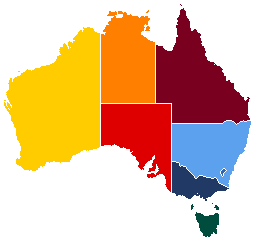Australian Women's Twenty20 Cup on:
[Wikipedia]
[Google]
[Amazon]
The Australian Women's Twenty20 Cup (WT20) was the premier domestic women's
 The Australian Women's Twenty20 Cup featured the same seven teams that competed in the Women's National Cricket League from the corresponding period of 2009 to 2015. In addition to each team's primary ground, matches were also played at a wide variety of alternate and boutique venues.
The Australian Women's Twenty20 Cup featured the same seven teams that competed in the Women's National Cricket League from the corresponding period of 2009 to 2015. In addition to each team's primary ground, matches were also played at a wide variety of alternate and boutique venues.
C = Champions; RU = Runners-up; SF = Semi-finalists; 1st = Ladder position after regular season
Twenty20 cricket
Twenty20 (abbreviated T20) is a shortened format of cricket. At the professional level, it was introduced by the England and Wales Cricket Board (ECB) in 2003 for the county cricket, inter-county competition. In a Twenty20 game, the two t ...
competition in Australia. Beginning in 2007 as a series of exhibition matches, the first official tournament took place during the summer of 2009–10. All seven state and territory representative teams from its 50-over counterpart, the pre-existing Women's National Cricket League, participated in the WT20's formal six-year span. The competition was replaced by the Women's Big Bash League in 2015.
The Victorian Spirit were the most successful team, having managed to claim three titles in a row. The New South Wales Breakers
The New South Wales Women cricket team, also known as the New South Wales Breakers, is the women's representative cricket team for the Australian State of New South Wales. They play most of their home games at North Sydney Oval and they also u ...
finished on top of the ladder at the conclusion of every regular season, but they lost three consecutive championship deciders against Victoria before eventually winning two titles of their own. The Queensland Fire also won one title.
Tournament structure
After experimenting with an informal five-match exhibition structure for each of its first two editions,Cricket Australia
Cricket Australia (CA) is the governing body for professional and amateur cricket in Australia. It was originally formed in 1905 as the 'Australian Board of Control for International Cricket'. It is incorporated as an Australian Public Company ...
delivered a fully-fledged competition for the 2009–10 season which was made up of a single round-robin before a final between the two highest-ranked teams. For 2010–11 and onward, the structure of the tournament was expanded to twelve rounds and a final (or, in the case of the 2013–14 edition, a finals series featuring the four highest-ranked teams) to determine each season's champion.
The competition was typically scheduled alongside, and interspersed with, the Women's National Cricket League as each team would draw from the same squad for both formats. In what was promoted as an "unprecedented" boost to the visibility of the women's game, the 2014–15 season featured eight fixtures paired as double-headers with the men's Big Bash League. This included the championship decider which was also broadcast live and nationally on free-to-air network Ten.
On 19 February 2015, Cricket Australia announced that the competition would be replaced by the Women's Big Bash League. The decision was made in an attempt to further heighten the profile and professionalism of elite-level women's cricket
Women's cricket is the team sport of cricket when played by woman, women. Its
Laws of cricket, rules are almost identical to those in the game played by men, the main change being the use of a smaller cricket ball, ball. Women's cricket is b ...
, thereby ideally helping to grow grassroots participation and viewership of the game among girls and women across the country.
Teams
 The Australian Women's Twenty20 Cup featured the same seven teams that competed in the Women's National Cricket League from the corresponding period of 2009 to 2015. In addition to each team's primary ground, matches were also played at a wide variety of alternate and boutique venues.
The Australian Women's Twenty20 Cup featured the same seven teams that competed in the Women's National Cricket League from the corresponding period of 2009 to 2015. In addition to each team's primary ground, matches were also played at a wide variety of alternate and boutique venues.
Tournament results
Season summaries
Final summaries
Team performance
Source: LegendC = Champions; RU = Runners-up; SF = Semi-finalists; 1st = Ladder position after regular season
Statistics
Most runs
Most wickets
References
External links
{{Authority control Defunct cricket competitions Australian domestic cricket competitions Women's Twenty20 cricket competitions 2009 establishments in Australia 2015 disestablishments in Australia Recurring sporting events established in 2009 Recurring sporting events disestablished in 2015